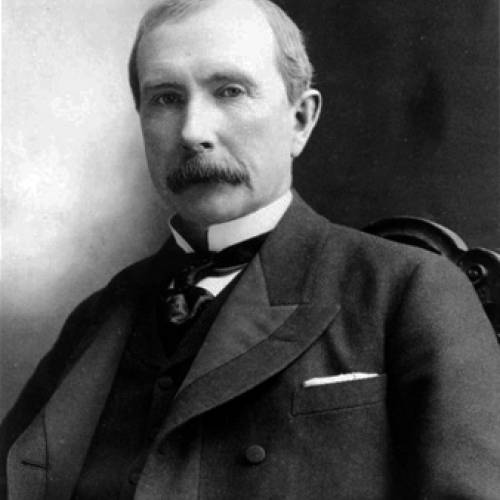 https://heaven.world/en/john-d-rockefeller
https://heaven.world/en/john-d-rockefeller
Firstname
John D.
Lastname
Rockefeller
Name
John D. Rockefeller
lived from:
1839-00-00
lived until:
1937-05-23
John Davison Rockefeller Sr. was an American oil industry business magnate and philanthropist, who is considered to be the wealthiest American of all time by virtually every source, and—largely—the richest person in modern history.
Born in upstate New York, he was shaped by his con man father and religious mother. His family moved several times before eventually settling in Cleveland, Ohio. He had various siblings, including William, who would enter the oil business with him. Rockefeller became an assistant bookkeeper at the age of 16, and went into a business partnership with Maurice B. Clark and his brothers at 20. He bought them out and went on founding Rockefeller & Andrews with his brother William and another shareholder — chemist Samuel Andrews. Instead of drilling for oil, he concentrated on refining. In 1867, Henry Flagler entered the partnership. The Rockefeller, Andrews & Flagler company prospered, incorporating local refineries, until the foundation of Standard Oil.
Rockefeller founded Standard Oil Company, Inc. in 1870 as an Ohio partnership with his brother William along with Henry Flagler, Jabez A. Bostwick, Samuel Andrews, and a silent partner, Stephen V. Harkness. He ran it until officially retiring in 1897. As kerosene and gasoline grew in importance, Rockefeller's wealth soared and he became the richest person in the country, controlling 90% of all oil in the United States at his peak.
Oil was used throughout the country as a light source until the introduction of electricity and as a fuel after the invention of automobile. Rockefeller had enormous influence on the railroad industry, which transported his oil around the country. Standard Oil dominated the oil industry and was the first great business trust in the United States. Rockefeller revolutionized the petroleum industry, and along with other key contemporary industrialists such as steel magnate Andrew Carnegie, defined the structure of modern philanthropy.
The U.S. Supreme Court ruled in 1911 that Standard Oil must be dismantled because it violated federal anti-trust laws; it was broken up into 34 separate entities that included companies that would become ExxonMobil, Chevron, and others. Some of them are still among companies with the largest revenue. The individual pieces of the company were worth more than the whole, and as shares of the individual companies doubled and tripled in value in their early years, Rockefeller became the country’s first billionaire with a fortune worth nearly 2 percent of the national economy. His peak net worth was estimated at $336 billion in 1913, two years after the dissolution of Standard Oil, at 74 years of age.
Rockefeller spent the last 40 years of his life in retirement at his estate, "Kykuit", in Westchester County, New York. His fortune was mainly used to create the modern systematic approach of targeted philanthropy. He was able to do this through the creation of foundations that had a major effect on medicine, education and scientific research. His foundations pioneered the development of medical research and were instrumental in the eradication of hookworm and yellow fever.
Rockefeller was also the founder of both the University of Chicago and Rockefeller University and funded the establishment of Central Philippine University in the Philippines. He was a devout and devoted Northern Baptist, and supported many church-based institutions. Rockefeller adhered to total abstinence from alcohol and tobacco throughout his life.
He was a faithful congregant of the Erie Street Baptist Mission Church, where he taught Sunday school, and served as a trustee, clerk, and occasional janitor.
Religion was a guiding force throughout his life, and Rockefeller believed it to be the source of his success. Rockefeller was also considered a supporter of capitalism based on a perspective of social Darwinism, and was quoted often as saying "The growth of a large business is merely a survival of the fittest".
Ormond Beach (FL), United States
https://en.wikipedia.org/wiki/John_D._Rockefeller